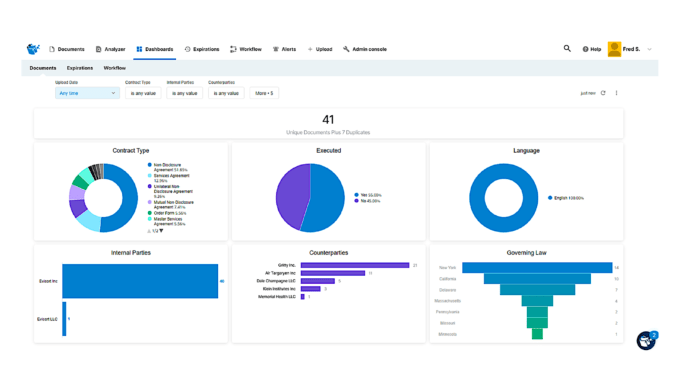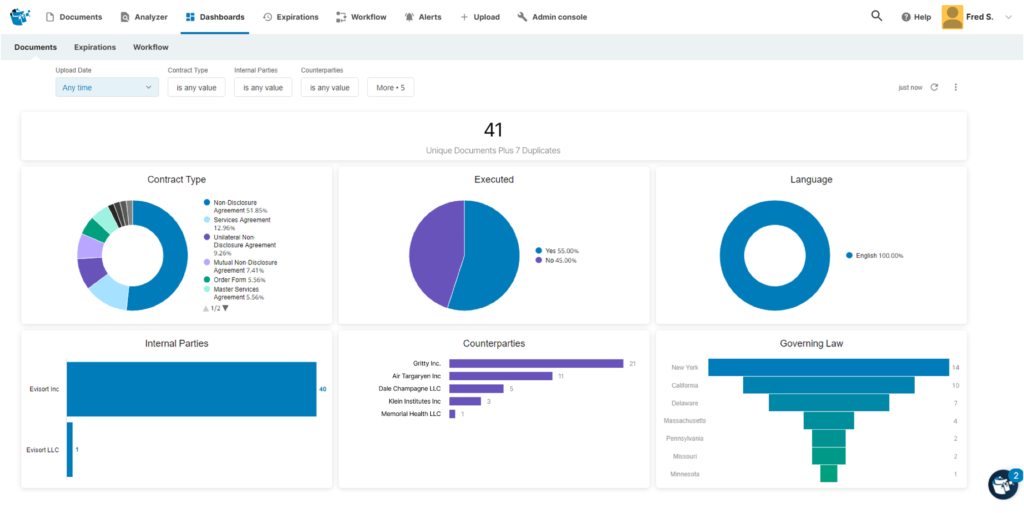
CLM company Evisort, which launched in 2016 and has pioneered the use of NLP to extract key contract data for inhouse teams, has now launched what it believes is ‘the first ever self-populating dashboard’ system. It’s a move that they no doubt hope sets them apart from some of the competition in what is a CLM market that is burning red hot at the moment.
The idea of creating contract data dashboards for inhouse teams has been with us for a long time now, but the challenge has always been: how do we get the data out of those thousands of contracts and into a visual display that retains a high level of accuracy?
And accuracy is essential here. There is no point having a dashboard that gives you the wrong termination dates for a bunch of high value contracts. So, how do you solve this? The main approach has been a mix of NLP with a lot of human input.
But, Evisort is now saying that they can ‘instantly visualise contract data and summarise key metrics without manual data entry’.
Now, that is quite a claim, especially if you are hoping for very high accuracy.
Many companies that do the same kind of dashboarding, even for a lot of basic info, use human reviewers and quality controllers; see Knowable for example, which is also very focused on dashboards and won’t even attempt to do this without human input throughout the process.
So, Artificial Lawyer put some questions to Evisort’s CEO, Jerry Ting, about these points, and especially with regard to accuracy in the absence of human quality control.
‘Evisort has long been able to quickly and with 95% accuracy ingest, extract, track, and organise data for all types of contracts – buy-side, sell-side, employment, real-estate, and industry-specific like BAAs and Custodial agreements – even third-party paper,’ Ting said.
‘Our AI-powered ability to turn contracts into searchable data in minutes is the foundation of Evisort and the (justified) skepticism and historical need to manually enter contract data into status quo contract management systems is why I and my Co-Founders started Evisort when we were at Harvard and MIT.
‘Our new Intelligent Dashboarding tools are built on top of our AI-powered contract analytics, which enables us to visualise contract data in minutes with a high degree of accuracy,’ he added.
Well, that was a good start. But, Artificial Lawyer pressed on the accuracy point. How can you guarantee 99% accuracy without human input and without human quality checking?
This was the reply: ‘Yes, you’re correct, only the highest paid lawyers who scrupulously review documents will get somewhat closer to 99% (which takes much longer to do and much more money), and yes there are oddly constructed, blurry, or damaged contracts out there that may require human quality control – but those are outliers with the Evisort platform not the standard.
‘So how do we do it? One big reason is how we triage documents with low quality meaning such that in no case will folks need to review 10k documents, at most a handful that need attention. For example, one of the data points we track is text quality which determines the quality of an OCR scan.
‘If documents have a low enough quality that could effect the accuracy of our algorithms we can triage them for additional manual review of the extracted data using alerts. However that is for outlier documents, for the vast majority of scanned PDF contracts all you need is a folder of those documents and we can generate dashboards from them in minutes – which is groundbreaking.’

Ting also added in a separate statement: ‘You can ingest 10,000 contracts into Evisort on Monday and walk into a board meeting on Tuesday with interactive dashboards that can show you how many vendor contracts you have, how many are executed, then drill into which of them have governing law in California, and when you have to issue notices for upcoming expirations and renewals.’
And he went on: ‘Evisort’s artificial intelligence quickly and accurately turns contracts into searchable data and tracks key info, dates, and clauses without manual data entry.’
So there you go. Bullish indeed. Perhaps the way to look at this is to consider whether we are talking about spotting dates and fairly direct legal statements about contract type or governing law, as opposed to handling more contextual clause analysis – which to be frank this site just doesn’t see reaching 99% accuracy without a lot of human quality control. But, for more objective and straightforward data points, then Evisort’s self-populating dashboards could be possible with high accuracy.
Perhaps what this product (and marketing…!) development shows more than anything else is that the CLM war is really heating up. A couple of weeks ago we saw ContractPodAi bag $115m in a new funding round led by the massive tech investor, SoftBank. And we have also seen a raft of other investments – see below.
- CLM Lexion Bags $11m, Wilson Sonsini Invests Again – June 2021
- CLM Leeway Bags $4.2m – Largest Ever French Legal Tech Seed Funding – March 2021
- LinkSquares – $40 Million Series B – July 2021
- NLP-Driven Contract Platform Evisort Bags $35m, Microsoft Fund Joins Again – Feb 2021
- CLM Icertis Bags $80m…! Values at $2.8 Billion – March 2021
- Agiloft Bags $45m Funding, Hires EY Law’s LMS Boss – August 2020
- Malbek Bags $15.3m in Series A funding – Sept 2021
- Denmark’s Contractbook Doc Automation Platform Bags $30m – May 2021
One could also note the purchase of Spring CM by DocuSign, and the list goes on. The CLM space is frenetic at the moment.
And while it’s true that there are a lot of large companies that could make use of CLM systems, especially those that provide some NLP capability to help with contract data, the reality is that there are only so many large companies that want to onboard a CLM system right now.
With all that growth capital in the CLM space comes a massive pressure to win new clients and grow those businesses. This in turn pushes these CLM companies to compete for market share with product innovations.
It will be interesting to see what happens next.